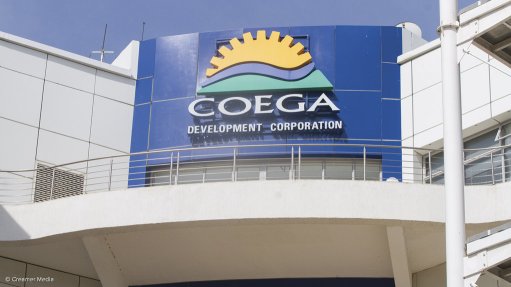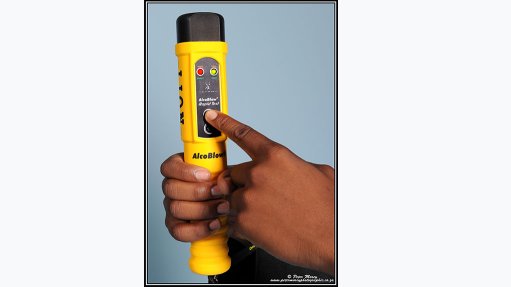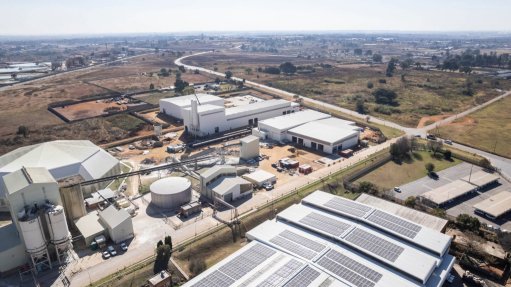SPS commissions R135m solar project at Aqunion abalone farm

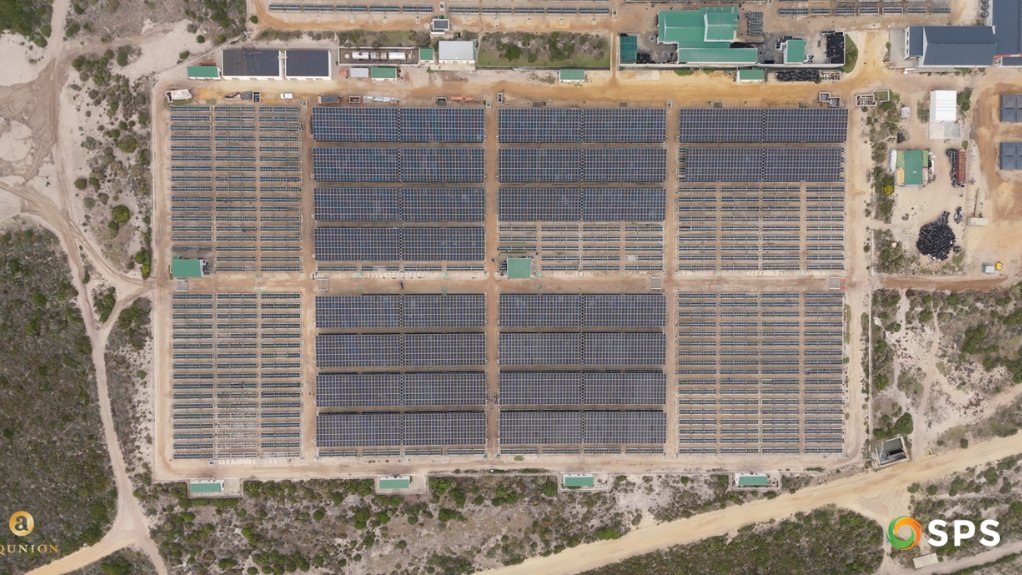
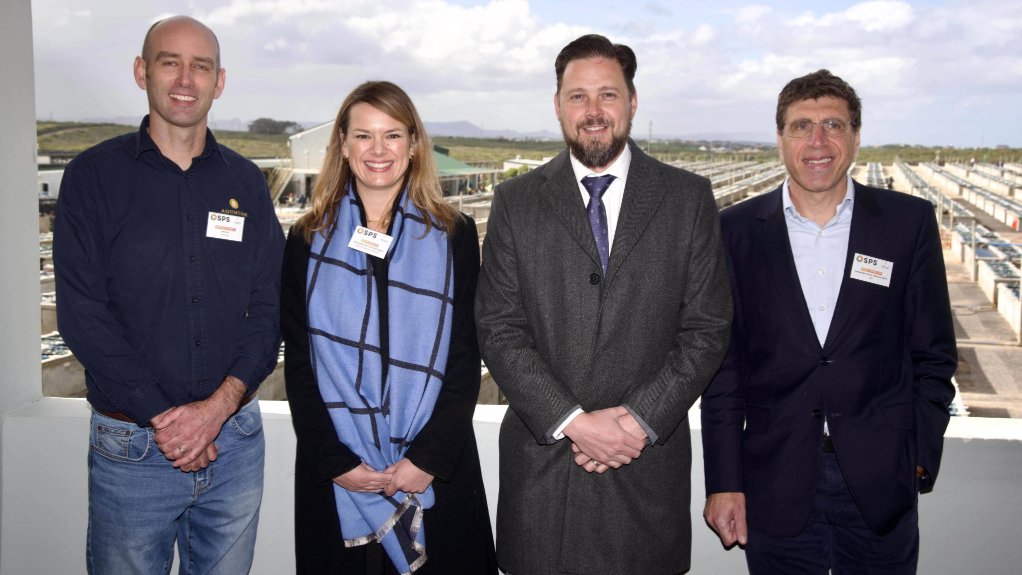
The Aqunion abalone farm in Romansbaai
Rowan Yearsley, SPS project development head Anja Visagie, Johan Wolmarans and SPS CEO Paul Mansour
Sustainable Power Solutions (SPS) has started to test and commission a R135-million solar PV and battery solution project for abalone farmer Aqunion, a subsidiary of the Sea Harvest Group.
Construction of the solar system began in November last year.
Founded in 2008, SPS has, to date, commissioned more than 250 solar and storage projects across sub-Saharan Africa, St Helena Island and the Seychelles.
SPS owns and operates the Aqunion system, located at Romansbaai, in the Western Cape, and sells the power to the abalone farmer.
Aqunion says the rising costs of electricity, and frequent loadshedding, frustrated its efforts to run an efficient operation at Romansbaai, which has an output of around 200 t of abalone a year.
“Our operations need a constant and reliable power supply to maintain the best conditions for our high-value abalone,” explains CEO Rowan Yearsley.
“SPS offered us a comprehensive solar and battery energy storage solution that align with our goals of reducing operational costs and improving our sustainability.
“We wanted a partner who could manage the energy production aspect while we focus on our core business of farming abalone,” he adds.
The SPS system, with a 20-year life-cycle, augments Aqunion’s existing hydro-plant and seawater storage facility.
SPS senior energy storage specialist Johan Wolmarans says the Aqunion system includes a battery-based energy storage system designed to deliver up to four hours of backup power, and a solar array capable of supplying about 22% of Aqunion's required yearly energy needs.
The total array size is 2.4 MWp, he notes. The battery inverter size is 3 MVA, and battery storage is 8.2 MWh.
“This solution not only helps Aqunion during peak operational times, but significantly reduces their reliance on diesel generators, reducing the associated emissions,” says SPS business development manager Charles Neethling.
The installation of the solar panels, placed over existing abalone tanks, required some custom engineering and special materials to withstand the corrosive environment so close to the ocean.
“It’s a hot, humid, windy environment with a high salt-spray content,” says Wolmarans.
“We had to seamlessly integrate with existing infrastructure and ensure the durability of the system, despite the harsh conditions. We made use of special bolts, for example, made from improved stainless steel compared with what we normally use.”
With the implementation of SPS’s renewable-energy solution, Aqunion anticipates a significant shift in its energy consumption profile.
“We expect to see our energy costs decrease over time and our reliance on renewable energy increase from 10% to 30%,” says Yearsley.
Wolmarans says the current prolonged lull in loadshedding is having an impact on SPS’s business, as well as that of its customers.
“We can see that customers are being cautious in proceeding with new projects.
“Solar power remains popular and a good investment, but the business case for using energy storage – we had to pivot a little bit, even though we still see a lot of opportunities.
“There remains, however, still a lot of opportunities in the off-grid space, with a number of communities that are unserviced [by Eskom], Also, with rising energy costs, it makes sense to use battery storage technologies.”
Article Enquiry
Email Article
Save Article
Feedback
To advertise email advertising@creamermedia.co.za or click here
Comments
Announcements
What's On
Subscribe to improve your user experience...
Option 1 (equivalent of R125 a month):
Receive a weekly copy of Creamer Media's Engineering News & Mining Weekly magazine
(print copy for those in South Africa and e-magazine for those outside of South Africa)
Receive daily email newsletters
Access to full search results
Access archive of magazine back copies
Access to Projects in Progress
Access to ONE Research Report of your choice in PDF format
Option 2 (equivalent of R375 a month):
All benefits from Option 1
PLUS
Access to Creamer Media's Research Channel Africa for ALL Research Reports, in PDF format, on various industrial and mining sectors
including Electricity; Water; Energy Transition; Hydrogen; Roads, Rail and Ports; Coal; Gold; Platinum; Battery Metals; etc.
Already a subscriber?
Forgotten your password?
Receive weekly copy of Creamer Media's Engineering News & Mining Weekly magazine (print copy for those in South Africa and e-magazine for those outside of South Africa)
➕
Recieve daily email newsletters
➕
Access to full search results
➕
Access archive of magazine back copies
➕
Access to Projects in Progress
➕
Access to ONE Research Report of your choice in PDF format
RESEARCH CHANNEL AFRICA
R4500 (equivalent of R375 a month)
SUBSCRIBEAll benefits from Option 1
➕
Access to Creamer Media's Research Channel Africa for ALL Research Reports on various industrial and mining sectors, in PDF format, including on:
Electricity
➕
Water
➕
Energy Transition
➕
Hydrogen
➕
Roads, Rail and Ports
➕
Coal
➕
Gold
➕
Platinum
➕
Battery Metals
➕
etc.
Receive all benefits from Option 1 or Option 2 delivered to numerous people at your company
➕
Multiple User names and Passwords for simultaneous log-ins
➕
Intranet integration access to all in your organisation












